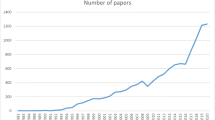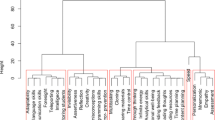Abstract
Educators are currently attempting to integrate computers into the classroom, in order to humanize their use. The strategies that have been adopted, however, are primarily logistical and ignore the philosophy that underpins this technology. It is argued in this paper that educational technology will not be humanized until it is understood to be sustained by a philosophy other than technological rationality, and thus is provided with a human base. The ‘life-world’ (Lebenswelt) is identified as a proper foundation for technology, because technological rationality is illustrated to be a modality of human expression. When this is the case, technology is placed in the service of humankind, for it cannot be conceived as the genesis of personal freedom.
Zusammenfassung
Gegenwärtig sind Pädagogen um die Integration von Computern ins Klassenzimmer bemüht, um deren Gebrauch zu humanisieren. Die dabei angewandten Strategien sind jedoch primär logistisch und ignorieren die theoretischen Voraussetzungen, auf die sich diese Technologie stützt. In diesem Bericht wird argumentiert, daß die Bildungstechnologie so lange nicht humanisiert wird, bis sie nicht in einem anderen Sinn als dem der technologischen Rationalität verbunden wird und auf eine humane Grundlage gestellt ist. Die Lebenswelt wird als ein wahres Fundament der Technologie identifiziert, da technologische Rationalität als eine Modalität menschlichen Ausdrucks dargestellt wird. Wenn dies der Fall ist, wird die Technologie in den Dienst der Menschheit gestellt, da sie nicht als Nemesis persönlicher Freiheit angesehen werden kann.
Résumé
Les pédagogues, aujourd'hui, tentent de faire entrer l'ordinateur dans la salle de classe, afin de ramener son utilisation à l'échelle humaine. Cependant, les stratégies adoptées demeurent de l'ordre de la logistique et ignore tout de la philosophie qui étaye cette technologie. Dans cet article, il est argué que l'on ne saurait humaniser la technologie au sein de l'enseignement, tant qu'il n'est pas entendu qu'une philosophie autre que la rationalité technologique la sous-tend, la dotant ainsi d'un fondement humain; l'environnement naturel (Lebenswelt) constitue la véritable base de la technologie car la rationalité ne représente qu'une modalité de l'expression humaine. Dans ce cas, la technologie est placée au service de l'humanité et ne saurait être conçue comme sanction de la liberté individuelle.
Similar content being viewed by others
References
Ballard, E.G.Man and Technology. Pittsburgh: Duquesne University Press, 1978.
Ballard, E.G. ‘Man or Technology: Which is to Rule?’. In Skousgaard, S. (ed.)Phenomenology and the Understanding of Human Destiny. Washington, D.C.: Center for Advanced Research in Phenomenology and the University Press of America, 1981, pp. 3–19.
Berger, P.L., Berger, B., and Kellner, H.Homeless Mind. New York: Random House, 1973.
Berlo, D.K.The Process of Communication. New York: Holt, Rinehart and Winston, 1960.
Bjorn-Anderson, N. and Rasmussen, L.B. ‘Sociological Implications of Computer Systems’. In Smith, H.T. and Green, T.R. (eds.)Human Interaction with Computers. London: Academic Press, 1980, pp. 57–123.
Brabner, G. ‘The Decline of Pedagocentricity’.Educational Technology. 10 (1970), No. 11, pp. 11–18.
Davies, I.K. ‘Introduction: The Nature of Educational Technology’. In Davies, I.K. and Hartley, J. (eds.)Contributions to an Educational Technology. New York: Crane, Russak, and Company, 1972, pp. 1–14.
The Definition of Educational Technology, Washington, D.C.: Association for Educational Communications and Technology (AECT), 1977.
Ehrmann, S.C. ‘Technology Could Change the Goals of a College Education’.Educational Technology. 24 (1984) No. 9, pp. 7–11.
Ellul, J.Technological Society, New York: Random House, 1964.
Fox, G.T. Jr. and DeVault, M.V. ‘Technology and Humanism in the Classroom: Frontiers of Educational Practice’.Educational Technology. 14 (1974), No. 10, pp. 7–12.
Goldes, H.J., ‘Designing the Human Computer Interface’,Educational Technology. 23 (1983) No. 10, pp. 9–15.
Gordon, I.J.Studying the Child in School. New York: John Wiley & Sons, Inc., 1966.
Green, M. ‘Technology and the Human Person’. In Witt, P.W.F. (ed.)Technology and the Curriculum. New York: Columbia University Press, 1968, pp. 133–144.
Heidegger, M. ‘Die Frage nach der Technik’, In hisVorträge und Aufsätze, Teil 1, Pfulligen: Verlag Günther Neske, 1967, pp. 5–36.
Held, D.Introduction to Critical Theory, Berkeley: University of California Press, 1980.
Ihde, D.Technics and Praxis, Dordrecht: D. Reidel, 1979.
Komoski, P.K. ‘Realizing The Radical Relatedness of Technology and Education’.Educational Technology. 12 (1972), No. 1, pp. 5–9.
Kurland, N.D. ‘The Impact of Technology on Education’.Educational Technology. 8 (1968), No. 20, pp. 12–15.
Landgrebe, L.Major Problems in Contemporary European Philosophy. New York: Frederick Ungar Publishing, 1966.
Lenk, H. ‘Technokratie und Technologie: Notizen zu einer ideologischen Diskussion’. In Lenk, H. (ed.)Technokratie als Ideologie. Stuttgart: Verlag W. Kohlhammer, 1973, pp. 105–124.
Mumford, L.Technics and Civilization. New York: Harcourt, Brace, and World, 1963.
Murphy, J.W. ‘A Modern View on the Transfer of Technology’.Science and Public Policy 12(3), 1985, pp. 144–148.
Pask, G. ‘Men, Machines and the Control of Learning’.Educational Technology Nov. 30, 1966, pp. 1–12.
Petrović, G.Marx in the Mid-twentieth Century. Garden City, N.Y.: Doubleday, 1967.
Rasmussen, J. ‘The Human as a Systems Component’. In Smith, H.T. and Green, T.R. (eds.)Human Interaction with Computers. London: Academic Press, 1980, pp. 67–97.
Schuurman & Egbert,Technology and the Future: A Philosophical Challenge. Toronto: Wedge, 1980.
Winner, L.Autonomous Technology. Cambridge, MA: MIT Press, 1977.
Rights and permissions
About this article
Cite this article
Murphy, J.W. Humanizing the use of technology in education: A re-examination. Int Rev Educ 32, 137–148 (1986). https://doi.org/10.1007/BF00620384
Issue Date:
DOI: https://doi.org/10.1007/BF00620384




